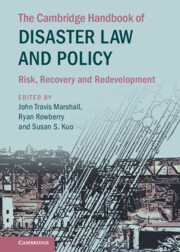Book contents
- The Cambridge Handbook of Disaster Law and Policy
- The Cambridge Handbook of Disaster Law and Policy
- Copyright page
- Dedication
- Contents
- Figures
- Maps
- Tables
- Contributors
- Foreword: Current Trends in Disaster Law and Policy
- Acknowledgments
- Introduction
- Part I Critical Perspectives on the Evolution of Disaster Law and Policy
- Part II Effective Governance as an Imperative for Responsive Disaster Law and Policy
- Part III Law’s Role in Promoting Hazard Mitigation: Intergovernmental, International, National, and Local Approaches
- Part IV Private Sector Initiatives to Promote Disaster Resilience and Recovery
- Part V Lawyers As Disaster Law and Policy Leaders: Training for Students and Guidance for Practitioners
- Part VI Cultural Heritage Protection and Cross-Disciplinary Opportunities for Advancing Disaster Law and Policy
- Part VII Disasters and Vulnerable Communities
- 30 After the Storm: The Importance of Acknowledging Environmental Justice in Sustainable Development and Disaster Preparedness
- 31 Social Constructions of Disaster Survivors and Displaced Populations: Implications for Policy Design
- 32 From Covid-19 to Climate Change: Disaster and Inequality at the Crossroads
- 33 Disasters and Disability
31 - Social Constructions of Disaster Survivors and Displaced Populations: Implications for Policy Design
from Part VII - Disasters and Vulnerable Communities
Published online by Cambridge University Press: 27 October 2022
- The Cambridge Handbook of Disaster Law and Policy
- The Cambridge Handbook of Disaster Law and Policy
- Copyright page
- Dedication
- Contents
- Figures
- Maps
- Tables
- Contributors
- Foreword: Current Trends in Disaster Law and Policy
- Acknowledgments
- Introduction
- Part I Critical Perspectives on the Evolution of Disaster Law and Policy
- Part II Effective Governance as an Imperative for Responsive Disaster Law and Policy
- Part III Law’s Role in Promoting Hazard Mitigation: Intergovernmental, International, National, and Local Approaches
- Part IV Private Sector Initiatives to Promote Disaster Resilience and Recovery
- Part V Lawyers As Disaster Law and Policy Leaders: Training for Students and Guidance for Practitioners
- Part VI Cultural Heritage Protection and Cross-Disciplinary Opportunities for Advancing Disaster Law and Policy
- Part VII Disasters and Vulnerable Communities
- 30 After the Storm: The Importance of Acknowledging Environmental Justice in Sustainable Development and Disaster Preparedness
- 31 Social Constructions of Disaster Survivors and Displaced Populations: Implications for Policy Design
- 32 From Covid-19 to Climate Change: Disaster and Inequality at the Crossroads
- 33 Disasters and Disability
Summary
Extreme weather events and catastrophic disasters have led to the widespread damage and destruction of homes and communities, and have produced large levels of involuntary displacement. Globally, the numbers of displaced persons are expected to grow due to the frequency and intensity of extreme weather events, increased population exposure, and vulnerability to natural hazards. Several sociolegal complexities and dilemmas arise in addressing the needs of displaced populations and disaster survivors for which policy, governance, and legal solutions are not clearly defined. In this chapter, we draw on theories of social constructionism and contend that social constructions of displaced populations can affect the adoption, design, and implementation of laws and policies that apply to disaster survivors and displaced populations. Specifically, we examine how the perceptions, framing, and characterization of target groups of displaced populations such as school-aged children, homeless and highly mobile families, and long-time residents who have precarious forms of immigration status, can influence governance issues that may arise during post-disaster recovery both within affected and host communities. The findings suggest that despite formal expectations of equal legal treatment, positive and negative social constructions of target populations can lead to benefits and losses for those affected and displaced by disaster.
Keywords
- Type
- Chapter
- Information
- The Cambridge Handbook of Disaster Law and PolicyRisk, Recovery, and Redevelopment, pp. 497 - 510Publisher: Cambridge University PressPrint publication year: 2022

